Want to jump straight to the answer? The best customer service software for most people is Gorgias or Freshdesk.
Good customer service software puts your support teams in the best possible position. They’ll stay better organized with less busywork. That’s more time to spend solving problems and delivering a five-star experience.
Your employees have exactly what they need the moment they pick up the phone or respond to a live chat. Your customers wait less time and never have to repeat information.
The 9 Best Customer Service Software
- Gorgias — Best integrations with ecommerce platforms
- Freshdesk — Best customer service software for keeping costs low
- Tidio — Best for AI automation
- LiveAgent — Best customer service software for live chat support
- HubSpot — Best free customer service software
- Zoho Desk — Best customer service software for ticketing
- Zendesk — Best customer service software with support suite options available
- Groove — Best customer service software for small teams and startups
- Help Scout — Best customer service software for nonprofits
After extensive research and testing, our team compiled in-depth reviews of each customer service software that we’re recommending.
Most of these vendors will let you try the software for free, and several of our recommendations actually offer free forever versions of their customer service software. So follow the links to get your free trial or demo—as seeing the software in action is the best way to assess its performance.
Best Customer Service Software Reviews
Read on to learn more about the top features, benefits, use cases, and pricing of each tool on our list.
Gorgias – Best Integrations with Ecommerce Platforms
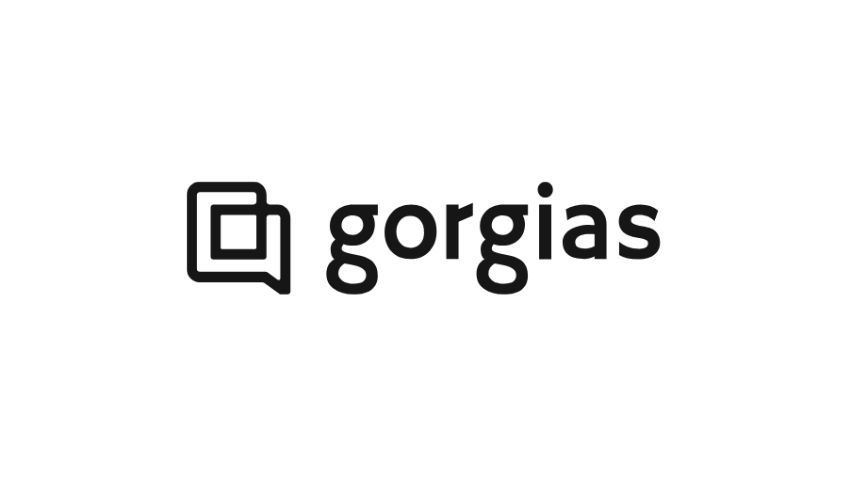
In ecommerce, the overlap between customer service and sales presents opportunities to create new, loyal customers. Gorgias offers an array of tools to help you maximize those opportunities.
One of the key ways Gorgias does this is through simple integration with three of the most popular ecommerce platforms out there: Shopify, Magento, and BigCommerce.
In all three cases, Gorgias pulls customer data, interactions, and order histories from the platform to give you a full view of your performance with customers.
For example, agents working in Gorgias will be able to update customer orders and addresses and issue refunds without having to log into Shopify separately.
Another area where Gorgias whines above the crowd is with its ability to automate repetitive tasks.
This reduces the chance that you’re making redundant contact with buyers, allows you to heavily personalize content, helps you set routine customer service tasks (like common questions or requests) on autopilot, and unlocks new customer insights through powerful machine learning.
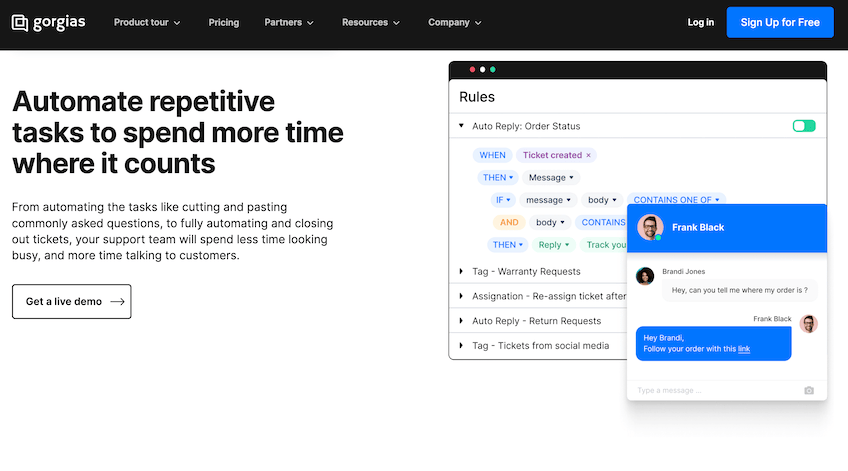
Beyond that, Gorgias offers a fantastically clean interface for your customer service reps to organize, address, and follow up on tickets. It centralizes communication across channels like SMS, social media, live chat, and email.
The omnichannel capability of Gorgias allows your team to engage with customers as they interact with ads, social posts, and other material before they even arrive at your website. So your customer service team is already warming up customers before they’ve even added anything to their cart.
There are plenty of basic automation features included with every plan, including automated rules, macros, chat campaigns, satisfaction surveys, and more.
But Gorgias also has a separate automation add-on that takes customer service automation to the next level.
This allows you to set up interactive customer flows that are highly interactive. For example, let’s say you’re selling beauty products online. If a new customer is unsure what products are best for their needs, then you can use an automated support flow that gives customers a personalized response based on their answers.
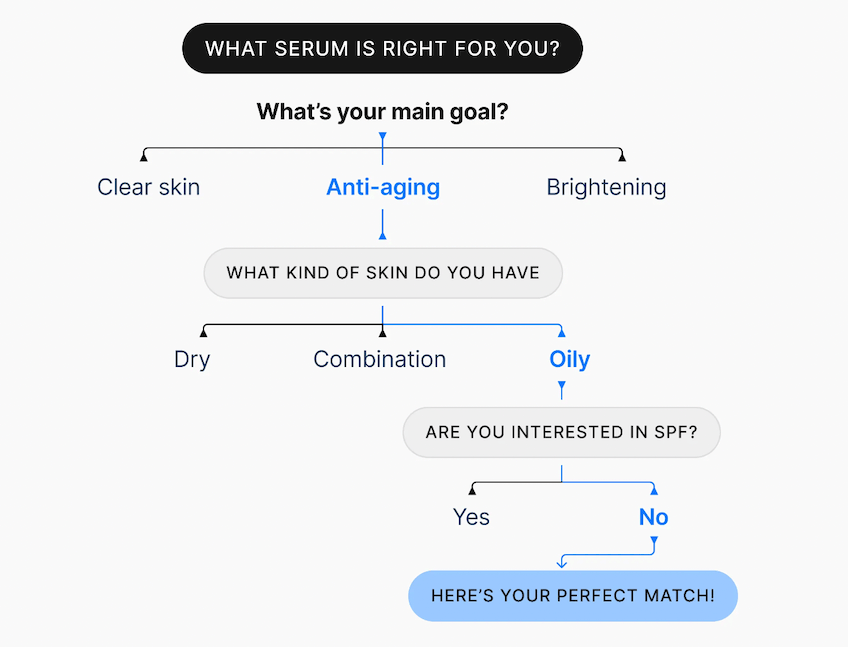
This also unlocks access to AI-based article recommendations. So when a customer asks a question via live chat, the AI can scan through all of your articles and find ones that include the answer.
The automation add-on starts at $25 per month for up to 30 interactions. But the actual cost is based on monthly usage.
Speaking of cost, the pricing for Gorgias is a bit steeper than other options on this list, but each tier allows for unlimited users and contains generous feature sets.
Starter — $10 per month
- Includes 50 tickets/month ($0.40 per extra ticket)
- Three user seats
- Unlimited social channels
- Up to 94 limited integrations
Basic — $60 per month
- Includes 300 tickets/month ($40 add-on for an additional 100)
- Unlimited users
- Live chat and chat campaigns
- Up to 150 integrations, including Shopify, BigCommerce, and social media platforms
Pro — $360 per month
Everything in Basic, plus:
- Includes 2,000 tickets/month ($36 add-on for an additional 100)
- Onboarding assistance
- Customer surveys
- Revenue statistics
- Magento integration
Advanced — $900 per month
Everything in Pro, plus:
- Includes 5,000 tickets/month ($36 add-on for an additional 100)
- Fully managed onboarding
- Team management tools
- Twitter integration
- A dedicated Customer Success Manager
You can reduce these rates by paying annually. The annual plan brings the cost of the Basic plan down to $50/month, the Pro plan down to $300/month, and the Advanced package down to $750/month.
It’s also worth noting that the entry-level Starter plan is only available on a month-to-month billing basis, with no discount or even option to pay for the year. Premium add-ons for automation, voice, and SMS aren’t available on this plan either—so what you see is what you get.
There is also a custom enterprise tier that can be arranged through consultation with Gorgias.
If your ecommerce business knows it’s leaving sales opportunities on the floor, give Gorgias a try through its seven-day free trial or by setting up a live demo.
Freshdesk – Best for Keeping Costs Low
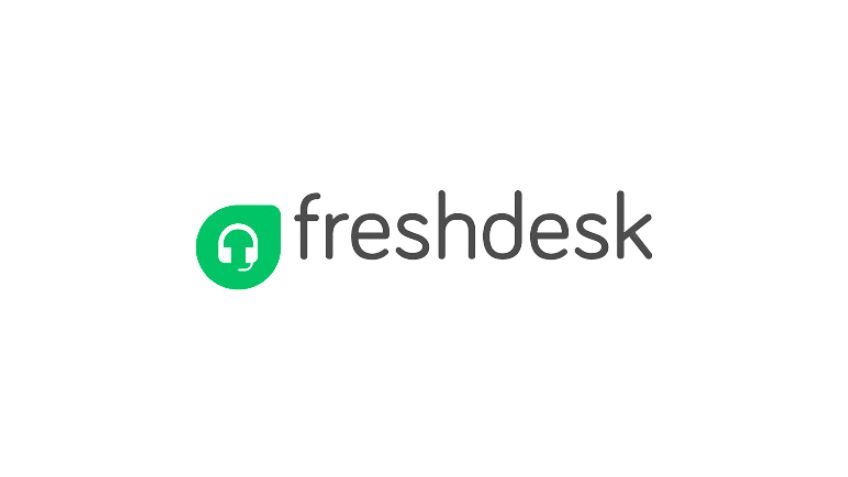
Freshdesk is another of the most popular help desk solutions on the market today. Why? Because it has everything you need for modern customer service teams at an exceptionally low price.
You can try the full platform for free for 21 days with as many agents as you like, with no credit card necessary. If you like it, agent pricing starts at $15 per month, or you can keep using a limited version of Freshdesk for free forever.
That’s right, a free forever customer service plan with unlimited agents. There are some features worth upgrading for, but you get the ability to track incoming tickets from email and social media.
For the small business that needs a better way to respond to incoming questions, Freshdesk is everything you need at no cost.
When you are ready to upgrade, Freshdesk offers several plans at competitive prices. Choose the channels you want to communicate, the type of support you want to provide, and design workflows that make sense for your line of business.
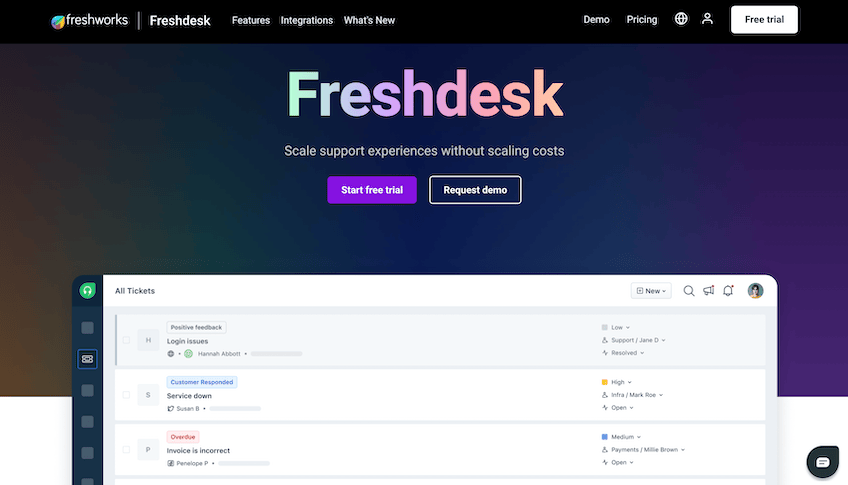
You won’t have to try and fit your customer service experience into a rigid template if you go with Freshdesk.
They offer a number of very useful features:
- Ticketing
- Collaboration
- Field service
- Automation
- Customer self-service
- Reporting
- Multi-channel support
This is great if you want to streamline your customer service solutions on a single platform. As such, Freshdesk makes team collaboration and automation a breeze.
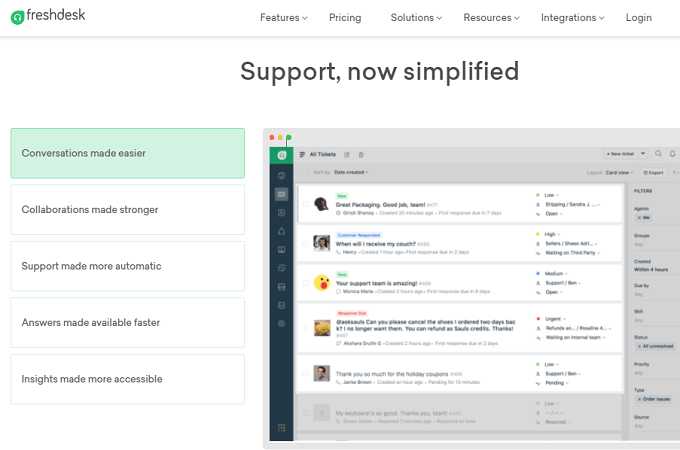
If you’re currently using another help desk solution and you’re unhappy with it, Freshdesk makes it easy for you to switch to its software. Their team will help you make the switch over easily.
And with Freshworks Academy, their in-house training service, you’ll be able to train any member of your team to nail the Freshworks system in no time.
Here’s an overview of the plans and pricing. All rates are based on an annual plan. The prices are a bit higher if you go month-to-month.
Free
- Up to 10 agents
- Email and social ticketing
- Team collaboration
- Knowledge base
- Ticket trend reports
Growth — $15 per month per agent
- Automations
- Collision detection
- Marketplace apps
- Helpdesk
- SLA management
- Business hours
Pro — $49 per month per agent
- Automated ticket assignment
- Custom agent roles
- Custom portal
- Enterprise reporting
- Multiple time zones and SLAs
Enterprise — $79 per month per agent
- Ticket assignment based on skills
- Create a testing environment without affecting agents or customers
- IP Whitelisting
- HIPAA compliant
- Extendable API rate limit
Omnichannel pricing (which includes phone and messaging channels) starts at $29 per month per agent. It’s definitely cheaper to stick with fewer channels, but this is an exceptionally low price for omnichannel support.
Freshdesk recently introduced an AI-powered tool—Freddy AI. It works out of the box and is designed to deliver personalized experiences to your customers.
Freddy also helps improve internal productivity and innovation through contextual insights, automation, and self-service. It even helps support teams enhance their tone and rephrase text in real time. But if you want access to Freddy AI, you’ll need to sign up for a Freshdesk Enterprise plan.
Another unique standout of Freshdesk is its “Day Passes” feature. This lets you add extra agents to your plan for a single day in times when you’re expecting a surge in traffic or support needs. It can work really well around the holiday season, when you’re rolling out new software, or if you’re acquiring customers from another company.
It helps you expand your support team as needed—without having to pay for those seats all year.
Freshdesk integrates with hundreds of the most popular business software brands, so it will likely dovetail right into your system without a lot of costly setup.
Try the full Freshdesk platform free with a 21-day trial.
Tidio – Best for AI Automation
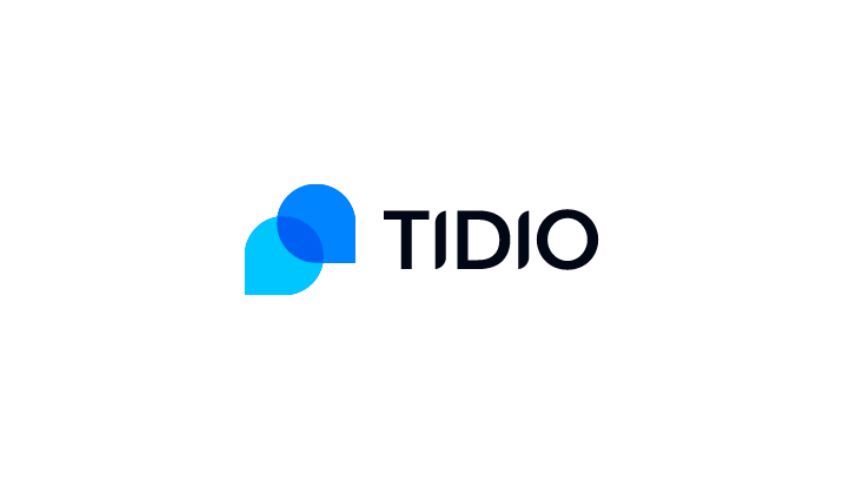
Tidio is somewhat unique compared to the other options on our list. The platform is designed to turn customer support inquiries into sales, which is accomplished through features like live chat, ticket support, and AI automation.
You can use Tidio to trigger a live chat with a website visitor to answer their questions in real time, and then make product recommendations or provide custom discounts based on their browsing behavior.
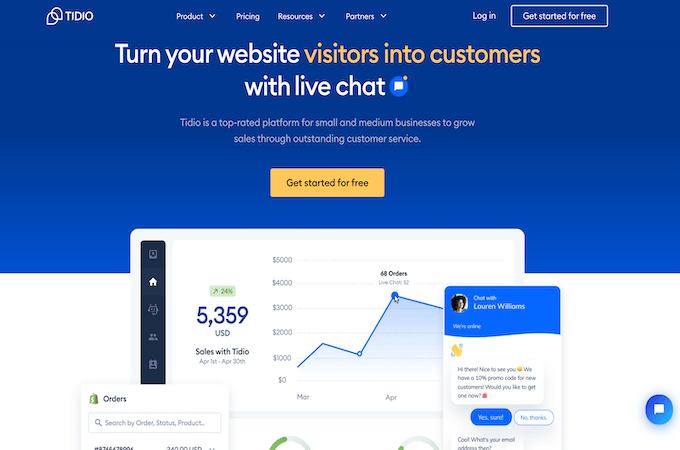
But what really makes Tidio stand out from the crowd is its incredible value. Rather than paying for tons of features or site visitors that you won’t reach, Tidio has the most affordable options for low-traffic websites.
Even the free plan comes with live chat, chatbots, and ticket support. As your traffic scales, Tido can scale with you. But the plan structure helps ensure you’re not overpaying, which is crucial for new websites on a tighter budget.
Let’s take a closer look at Tidio’s plans and pricing:
Free — $0
- 50 live chat conversations
- 100 chatbot triggers
- Unlimited tickets
- Three seats included
- Instagram and email integration
- AI reply assistant
Starter — $29 per month
- 100 live chat conversations
- 500 chatbot triggers
- Unlimited tickets
- Live visitor list
- 24/5 support from Tidio
Communicator — $25 per seat per month
- Unlimited live chat conversations
- 100 chatbot triggers
- Unlimited tickets
- Department routing
- Up to five seats
Chatbots — $29 per month
- 50 live chat conversations
- 2,000 to 40,000 chatbot triggers
- Unlimited tickets
- Three seats included
- Can be bundled with Communicator plan
Tidio also has an enterprise-grade plan called Tidio+ that’s designed for high-traffic sites and starts at $394 per month.
But the vast majority of new websites can sign up for the Free or Starter plan to get their feet wet with Tidio. Once you get your automations figured out, you can always upgrade if you’re exceeding your monthly plan limitations.
Tidio is one of the only customer support tools that offers unlimited ticketing and AI chatbots for free. So it’s tough to pass up on that type of value.
Try all Tidio features for free with a seven-day trial—no credit card required. You can also get two months for free if you sign up for annual billing.
LiveAgent – Best for Live Chat Support
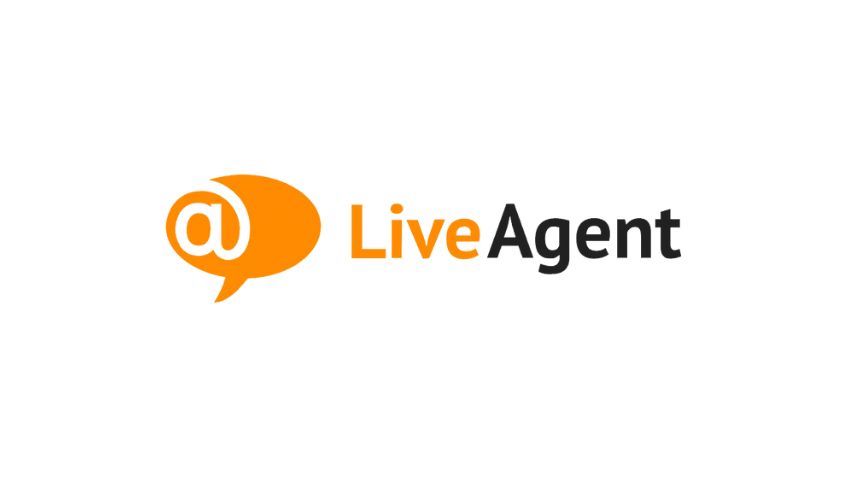
LiveAgent helps you manage all customer requests from multiple channels in a single platform.
Merge all communication and support to one place—no matter where your customers are.
LiveAgent saves you time, simplifies the process, and allows you to increase the profitability of your support team.
LiveAgent has tools for:
- Email ticketing
- Live chat
- Voice and video calls
- Social media integration
It’s built for the modern customer service team. Your employees only have to navigate a single interface in order to be present for customers on any channel you need.
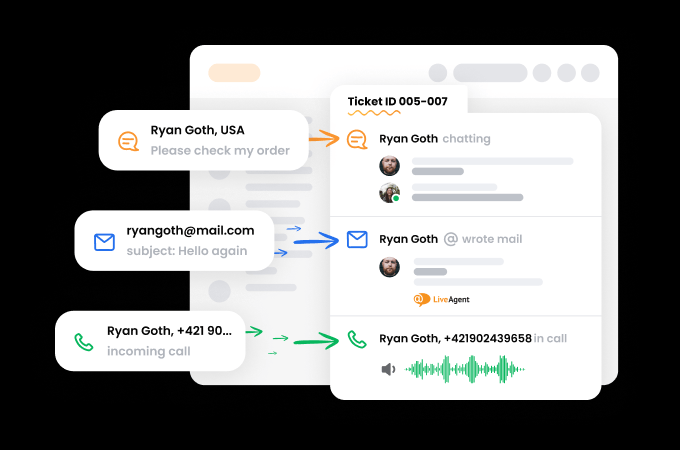
With LiveAgent, the entire customer conversation is right in front of your agents–even if it began with a chat, switched to email, and then to phone.
Customers don’t have to repeat information, and the agent isn’t scrambling to find information. It’s just a better experience for everyone.
Here’s a closer look at the plans and prices for LiveAgent’s customer service software:
Small Business — Starting at $9 per month per agent
- 3 incoming and outgoing email accounts
- 2 live chat buttons
- 1 knowledge base
- 10 departemtns
- 50 event rules
Medium Business — Starting at $29 per month per agent
- 10 incoming and outgoing email accounts
- 5 live chat buttons
- Call center support
- 20 departments
- Custom domain hosting
- 150 event rules
Large Business — Starting at $49 per month per agent
- 150 incoming and outgoing email accounts
- 20 live chat buttons
- 3 WhatsApp accounts
- 2 knowledge bases
- 500 event rules
- Audit logs and custom roles
Enterprise — Starting at $69 per month per agent
- 500 incoming and outgoing email accounts
- 50 live chat buttons
- 300 departments
- 10 knowledge bases
- Priority support
- Senior account manager
Overall, it’s a simple and flexible tool for managing live customers with ticketing and live chat. Try it for free.
HubSpot – Best Free Customer Service Software
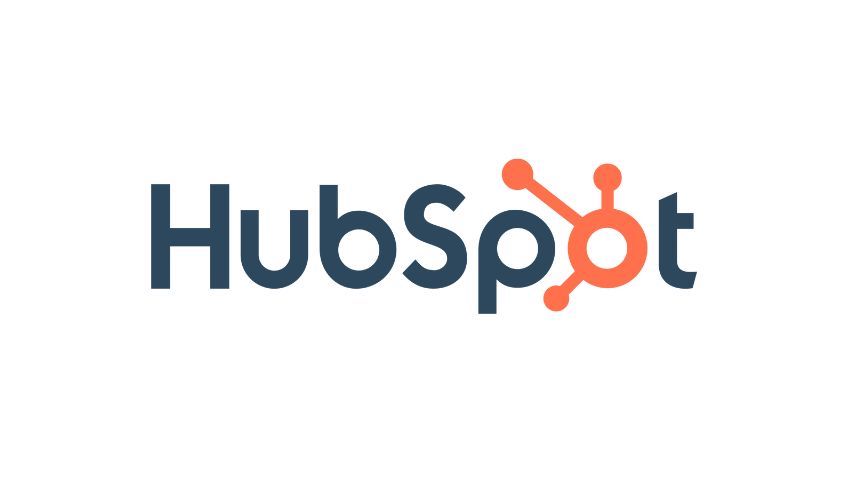
HubSpot offers some of the greatest tools on the internet for connecting with customers and nurturing relationships. They are better known for marketing and sales, but their customer service software is exceptional as well.
The best part for small businesses is that you can use HubSpot’s customer service software for free. They also offer freemium software for sales, marketing, and the best free CRM on the market.
Free features for HubSpot’s customer service software include:
- Ticketing
- Live chat
- Chatbots
- Team email
- Conversations inbox
- email templates
- Closed ticket reports
- Time-to-close reports.
HubSpot is proof that you don’t need to spend a ton of money on improving your customer service with software. After all, this won’t cost you a thing.
Upgrading to a premium plan, known as HubSpot Service Hub, gives you a lot more tools for building out and automating workflows. You certainly don’t need to be a developer to create exactly what you need.
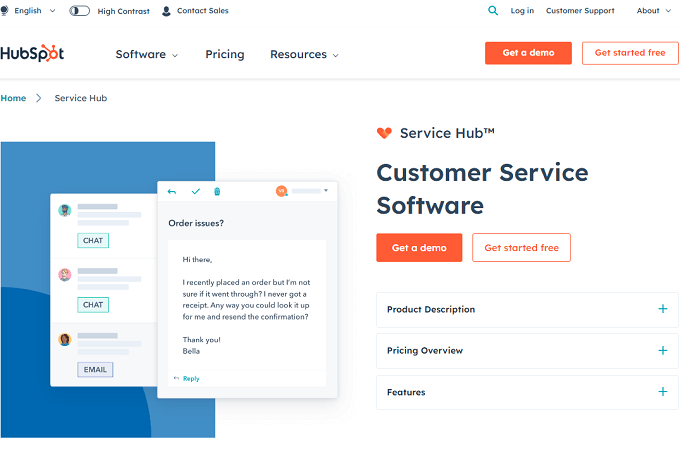
For those of you who want access to advanced features and benefits, here’s a overview of the paid plans:
- Service Hub Starter — Starts at $18 per month
- Service Hub Professional — Starts at $450 per month
- Service Hub Enterprise — Starts at $1,200 per month
All of the above rates are based on an annual contract. Month-to-month rates for the service Hub start at $20 for the Starter plan and $500 for Professional.
HubSpot also offers a full suite of product bundles for marketing, sales, service, CMS, and operations in a single plan. This is the best value option if you’re planning to use any other HubSpot tool.
The Starter CRM is based on the size of your contact list and starts at $30 per month with a yearly commitment. Try HubSpot for free to get started.
Zoho Desk – Best for Ticketing
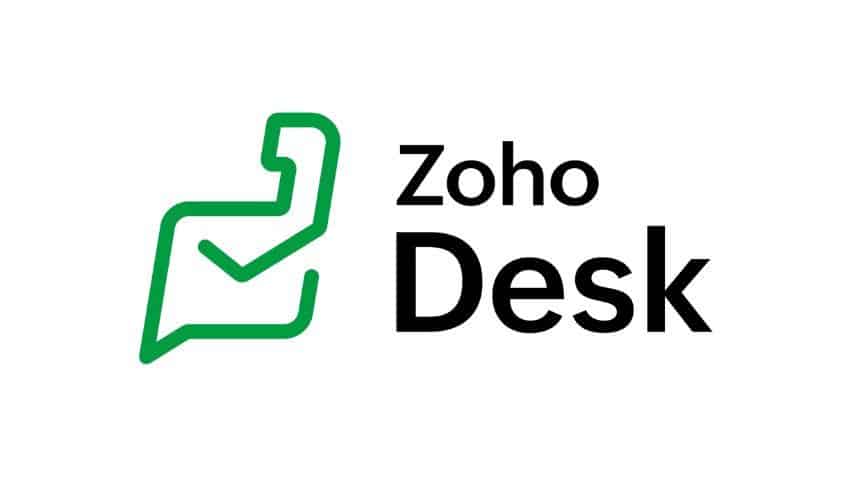
Zoho is one of the most popular names in the world of business software and CRM. They offer tools for sales, marketing, email, collaboration, finance, accounting, human resources, and business intelligence.
But one of the best solutions they offer is Zoho Desk—IT and help desk software. You can set up a ticketing system that spans whatever channels you use–phone, chat, social, email, and more.
You’ll also be able to route tickets between departments quite easily. Whether your company has multiple brands under one roof or different tiers of customer support, you’ll be able to set up efficient workflows.
All of this saves your customers time and improves their experience. They get in touch with the right person and receive relevant assistance. They could reach out by email and call back–your service agents will see the whole interaction.
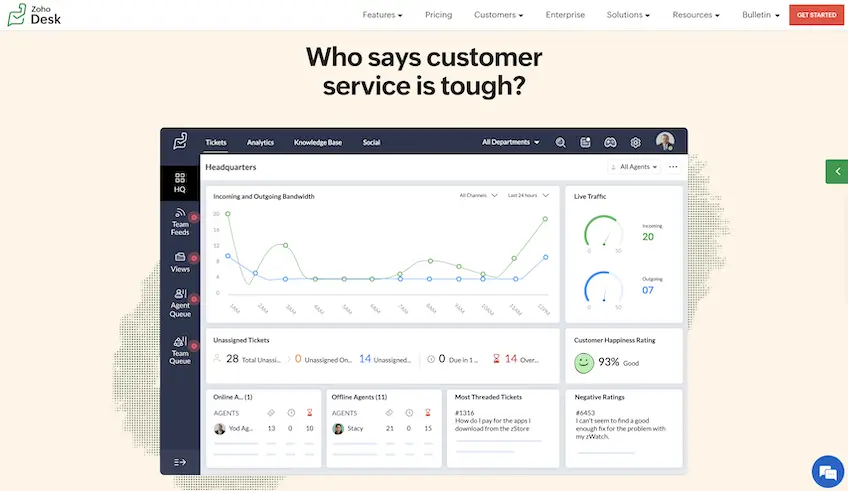
Zoho Desk has solutions for customer service agents, managers, and customers. But above all, it’s arguably the best customer service software for managing and closing tickets.
Let’s take a closer look at the plans and price points for Zoho Desk:
Free — $0
- Up to three agents
- Email ticketing
- Help center
- Private knowledge base
- Predefined SLAs
- Mobile app
- Multilingual help desk
Standard — $14 per month per agent
- Social and community channels
- Product-based ticket management
- Public knowledge base
- Escalations
- Workflow and assignment rules
- Supervise rules
- Customer happiness ratings
Professional — $23 per month per agent
- Multi-department ticketing
- Team management
- Telephony
- Automated time tracking
- Ticket templates
- Ticket sharing
- Mobile SDK
Enterprise — $40 per month per agent
- Live chat
- AI
- Customize help center
- Advanced process management
- Scheduled reports
- Validation rules
- Role-based data sharing
No matter how big, small, or complex your business is, Zoho Desk has a plan for you. Try it for free.
Zendesk – Best Software with Support Suite Options
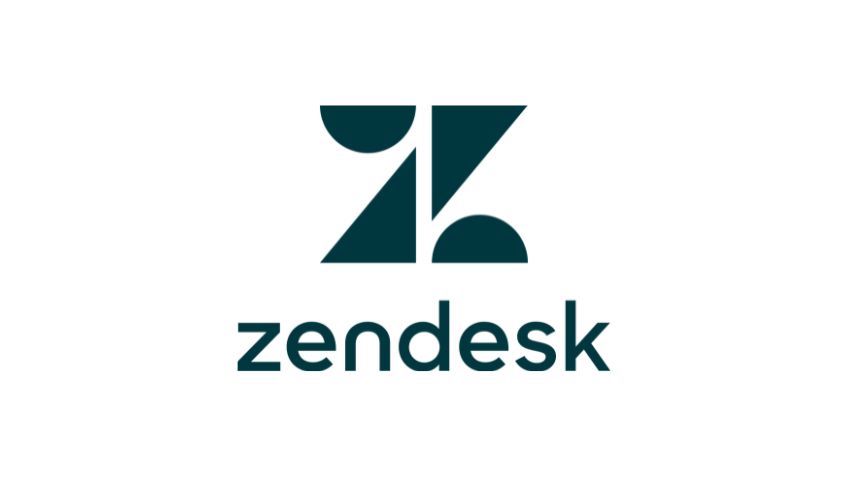
Zendesk is one of the best overall customer service software solutions on the market today. It’s used by 169,000+ businesses in 160+ countries, including big brands like Uber, Venmo, Shopify, and Slack.
They’ll give you all the tools you need to manage omnichannel customer service. You can provide customer support via email, live chat, voice, Facebook, Twitter, WeChat, WhatsApp, and more.
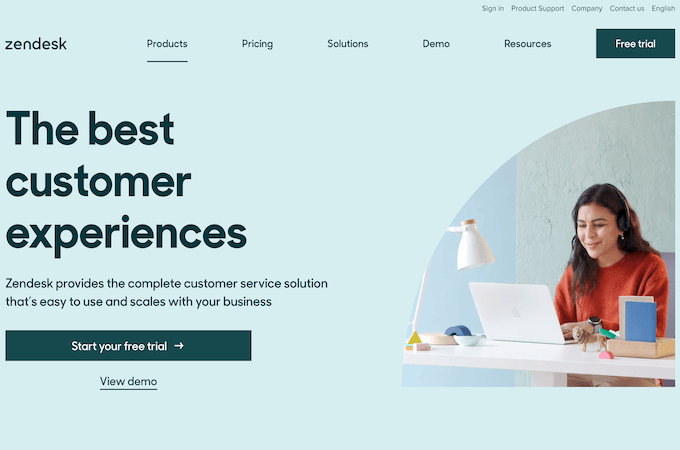
The software makes it possible to connect all of your data sources to a single location. So when a customer contacts you for support, the right information will automatically be on display.
Zendesk is flexible, so it can support the needs of any business. You can get a customized solution that fits with your existing support environment.
You can deliver messaging for customers through web pages, mobile devices, and social networking sites. Should a customer report a problem through Twitter or Facebook, you can have Zendesk generate a ticket automatically.
Agents can also take service to the next level using Zendesk AI. This newly-released feature comes with built-in intelligence and context to help agents solve problems faster. The AI will automatically generate suggestions to fix the issue and help reduce repetitive work throughout your service flow.
Some AI bots can even solve requests without the need for an agent to intervene.
Here’s a quick overview of the plans, features, and pricing for the Zendesk support suite with an annual subscription:
Suite Team — Starts at $55 per agent per month
- Ticketing support
- Web, mobile, and social messaging
- Voice, SMS, and live chat support
- Up to 50 AI-powered answers
- A single help center for customer self-service
Suite Growth — Starts at $89 per agent per month
- Up to 100 AI-powered answers
- Multiple help centers for customer self-service
- AI-powered knowledge management
- Multilingual support and content
- Custom ticket layouts
Suite Professional — Starts at $115 per agent per month
- Omnichannel support
- Social messaging add-on
- Self-service knowledge base
- Dashboards and reporting for all channels
- Talk partner edition
- Multiple ticket forms
- Skills based routing
Suite Enterprise — Custom Pricing
- Guided mode to prevent cherry-picking tickets
- Multi-brand support
- Chat widget and web SDK
- AI-powered content cues
- Content cues to identify knowledge gaps
- 24/7 live chat and phone support
Month-to-month plans are also available starting at $69 per agent.
You can try any Zendesk software or support suite with a free trial. If you’re looking for a customized solution, contact the Zendesk sales team.
Groove – Best for Small Teams and Startups
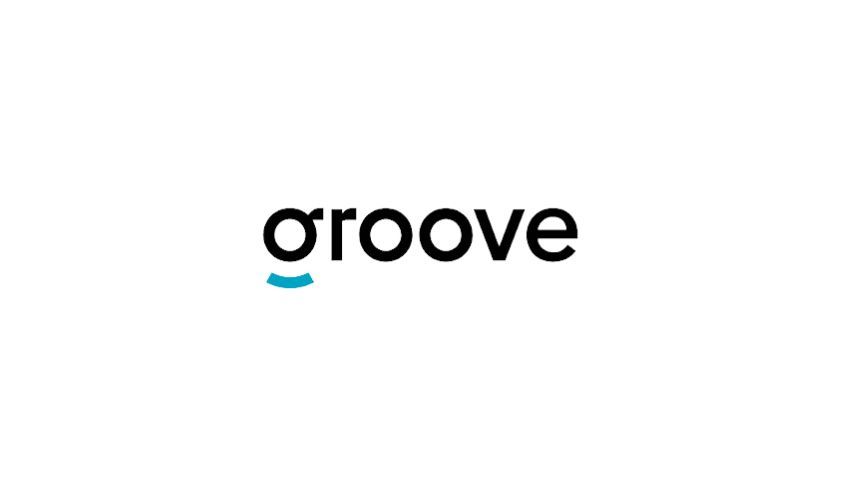
If your business has outgrown email for customer support and you’re fielding inquiries on multiple channels, Groove should definitely be on your radar.
The platform really shines above the crowd with its team collaboration tools. You can add private notes to internal discussions, quickly mention teammates to bring them in the loop, and assign specific tasks to members of the team.
Groove has a shared inbox feature that’s perfect for teams that were previously using basic email for customer service. This feature alone will eliminate so many clicks and workflow steps by simply assigning a ticket directly from the inbox.
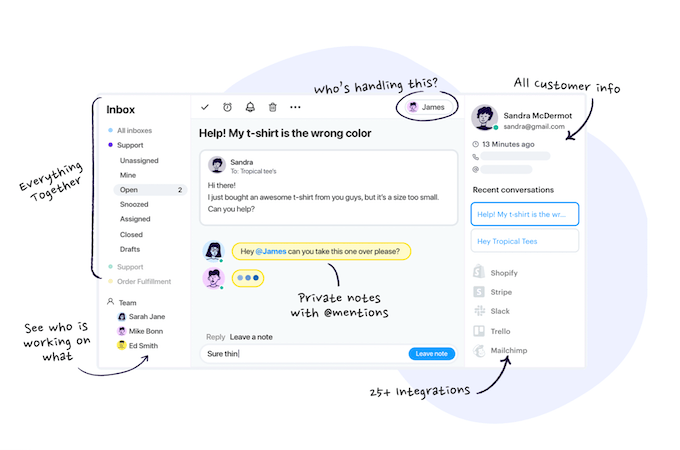
Groove’s robust automation features make it easy for any team to streamline customer support. You can set rules, tags, canned replies, and custom folders to match your preferences and eliminate busywork.
Another standout feature of Groove is the ability to customize your knowledge base. This is crucial for businesses that want to offer customers self-service tools.
The knowledge base themes are fully customizable, beautifully designed, and mobile responsive.
Groove recently added some powerful AI features to its customer service software. This allows you to use generative text in your knowledge base with instant replies. It can also be used to summarize long conversations with customers, eliminating the need for reps to go back and re-read entire threads to know what’s happening with a particular case.
You can also use Groove’s AI to improve writing, fix spelling and grammar, make text shorter, make it longer, simplify language, make text more formal, and so much more.
Here’s a closer look at Groove’s plans and pricing:
Standard — $15 per seat per month
- Up to 5 seats
- 5 channels
- 6 months search history
- Team collaboration features
- Knowledge base
- Help Widget
- 5 rules
- 10 instant replies
Premium — $25 per seat per month
- Up to 15 seats and 10 channels
- Unlimited search history
- Unlimited rules and advanced rules
- Unlimited instant replies
- Unlimited knowledge base
- Unlimited hellp widgets
- Over 20 integrations
- Customer satisfaction ratings
- API and webhooks
- AI features
Advanced — $45 per seat per month
- Up to 50 seats
- Unlimited channels
- Round robin with load balancing
- Unlimited smart folders
- Priority support
- Integrations with Salesforce, HubSpot, and Jira
There’s also an Enterprise tier offering a customized price for teams that need more than 50 seats and custom integrations. The rates above are based on month-to-month billing. But you can save 20% by signing up for an annual subscription.
Groove provides a seven free-trial period with all levels. You don’t need to provide a credit card when you are signing up, which is nice.
Overall, Groove is perfect for small teams and startups. Sign up now to start your seven-day free trial today.
Help Scout – Best for Nonprofits
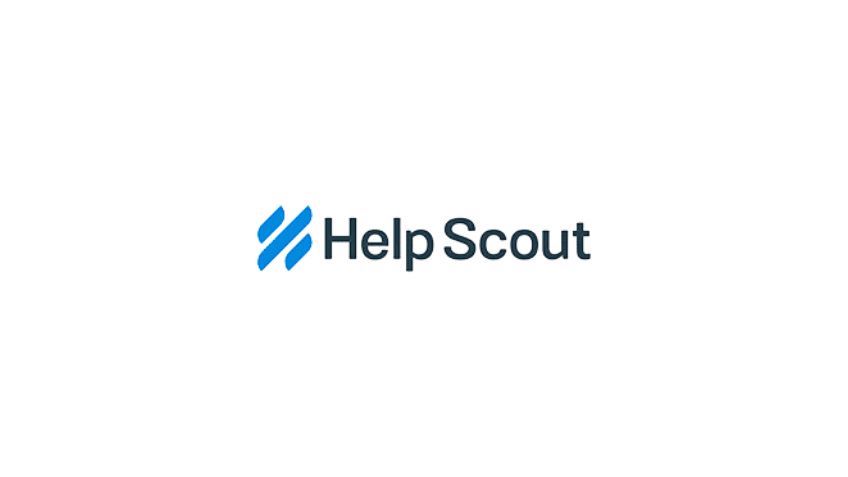
Help Scout is unique because it’s a Certified B corporation, meaning it strives to make a positive impact on the environment and communities. So it really goes the extra mile to support organizations that share the same values.
If you have a nonprofit that supports human rights, environmental sustainability, or underrepresentation in tech, Help Scout will provide a significant discount on your customer service software.
Some of you might even be eligible for discounts of up to 100%. That’s right—free.
Even if you don’t fall into one of those categories, Help Scout is still a top solution for customer service.
You can set up shared inboxes for your team and make it easy to collaborate. You can also give your customers the ability to send you an email if your team isn’t able to respond quickly enough to incoming chat requests
The interface is very welcoming, too. This is not a tool you are going to have to spend tons of time training people how to use.
Here’s a closer look at the plans and prices:
Standard — $20 per month per user
- Two mailboxes
- One docs site
- Beacon help widget
- Live chat
- In-app messaging for up to 2,000 unique viewers
- Custom reports
- Automated workflows
- 50+ integrations
Plus — $40 per month per user
- Basic features found in Standard tier
- Five mailboxes
- Two docs sites
- Custom fields
- Teams
- Salesforce, HubSpot, and Jira apps
- HIPAA compliance (as an add-on)
- Enterprise security (as an add-on)
Pro — $65 per month per user
- Basic features found in Plus tier
- 25 mailboxes
- 10 docs sites
- Enterprise-grade security
- HIPAA compliance
- Concierge onboarding service
- Dedicated account manager
These rates are based on an annual contract, which saves you about 20% versus paying on a month-to-month plan.
You can try Help Scout for free with a 15-day trial. The free trial period is available for both the Standard and Plus pricing tiers. If you have interest in the Pro pricing tier, you must reach out to the Help Scout customer service team for more information.
How to Choose the Best Customer Service Software For Your Business
There are certain features and considerations to keep in mind as you’re evaluating different options.
This is the methodology that we use and recommend here at Quick Sprout.
Number of Agents
Companies with five service reps won’t need the same software as a business with 50.
That’s why your customer service team’s size is crucial to your ultimate choice.
Larger teams need features for things like collaboration and role-based ticketing, but that won’t be necessary for a smaller business.
Features like shared inboxes are really important for teams with lots of agents. This helps ensure that if a customer is communicating with multiple agents related to the same issue, everyone can see the entire history of that conversation. Not only does this make things easier for your staff, but it also improves the customer experience—as they won’t have to constantly repeat themselves.
Communication Channels
What’s the ideal way (or ways) for customers to get in touch with your company? Good customer service software will support a range of channels, including:
- Phone
- Live chat
- Chatbots
- Support tickets
- Social media
Adding more channels gives customers more options, but it also makes more work for your company on the backend. This is why it’s important to find customer service software that brings all these channels together.
A tool like Live Agent, allows an employee to see a single history of customer interactions across all channels. A person could reach out on Facebook, get help via email, and call back months later–your customer service rep sees the entire story.
You can imagine how jumbled it would be if you are offering multi-channel service without giving employees a single dashboard to manage it.
Overall, multi-channel support has become a must-have feature for modern organizations. Every customer has different communication preferences, and your brand needs to find ways to accommodate them. Choosing a customer service software with omnichannel support simplifies this process for your team.
Feature Bundles
Every customer service software on our list does an exceptional job of marketing its top features. But with that said, you should only focus on the features you need the most.
For example, are you looking for customer service software specifically for live chat? LiveAgent will be a top choice for you.
If you’re happy with the CRM that your business is currently using, then you can safely ignore these types of features. But it’s going to make things much easier if your customer support software seamlessly integrates with the other tools that you’re using. This will eliminate the need for agents to bounce back and forth between multiple screens and tools while they’re assisting customers.
Identify the features you definitely need. Then look for the right plan that has all of those features.
Price
The price for customer service software varies on a wide range of factors. Lots of solutions charge you based on the number of customer service agents on your team.
Available features in your package will also have a significant impact on what you pay. It’s generally cheaper to access features if they’re bundled within a plan. But some tools give you the option to customize add-ons as additional charges to your base subscription.
Customer service is definitely not something you should skimp on. It’s okay to spend money. But with that said, not all of you need to go overboard. Small businesses, startups, and nonprofits with smaller teams can use free customer service software without compromising quality.
Expected Response Time
The type of customer service software that’s best for your business can ultimately be based on your customer’s expectations. This varies significantly by business type or industry.
Obviously, faster support is always preferred. But that’s not always necessary for smaller businesses.
A local restaurant probably doesn’t need to have 24/7 live chat available for its customers. Phone support during business hours is probably more than enough.
But a B2B software company that clearly defines support expectations in SLAs would need customer service software that meets those standards.
Live Support vs. Self-Service
In a perfect world, a customer will always have the option to get in touch with a live agent through a communication channel of their preference. But this isn’t realistic for every business and budget.
Most companies don’t have the staff or resources to offer live agent support 24/7/365.
In these scenarios, you can look for customer self-service alternatives. Choosing a tool that has an extensive knowledge base solution can help your customers find answers and troubleshoot problems on their own. These self-service tools are always available 24/7 and don’t require any interaction with a live agent.
To give your customers the illusion of live support, you could potentially add a chatbot to your website that directs customers to your knowledge base. Some of these bots can even recommend specific articles based on the customer’s question.
The Top Customer Service Software in Summary
Happy customers come back and spend more money. Unsatisfied customers can cause significant damage to your reputation. That’s why you should rely on the best customer service software like Gorgias, LiveAgent, Freshdesk, and HubSpot.
Every business needs to prioritize customer service. To deliver flawless service and maintain happy customers, you can leverage the power of software to automate and streamline your system.
